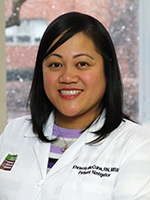What is a patient navigator? Part III of our series
October 7, 2018

From cancer screening to diagnosis and treatment, these specially trained medical professionals guide you through the process. Our Patient Navigator series takes an in-depth look at a skilled group of caring people who support the award-winning cancer programs offered at NCH.
Meet Khriscia McCune, R.N., MSN, Colorectal Patient Navigator who provides personalized guidance to oncology patients at NCH as well as providing community outreach education to raise awareness about the value of prevention and early detection of colorectal cancer.
What is your background?
I received my BSN from the University of St. Francis and my MSN from Chamberlain University. I began my nursing career at Northwestern Memorial Hospital in General Medicine. I eventually transitioned to the GI lab there and learned so much. Wanting to stay in that specialty and seeing a great opportunity to work closer to home, I applied to the GI Digestive Disorders Center and Pulmonary Center here at NCH.
How did you end up becoming a patient navigator?
After working at the NCH GI and Pulmonary Center for a couple years, I was approached about a new position being created in Cancer Services, a colorectal navigator. I saw it as a wonderful opportunity to stay connected to the specialty but enter a different realm of nursing.
What are some ways that you help patients who have colorectal cancer?
Once a patient receives pathology results from a gastroenterologist, I follow up with a phone call to provide support and guidance. Oftentimes, patients are so overwhelmed that they fail to recall what the next steps should be. I explain what lab and imaging tests are recommended as a part of their work-up and why they’re important. I offer to coordinate their appointments with a colorectal surgeon, medical oncologist and radiation oncologist (if necessary) to alleviate the burden and minimize the confusion. If they require financial assistance, transportation resources to and from treatments and emotional support, I assist in those areas to reduce their treatment time. My job is about addressing the patients’ needs to ensure they are supported from initial diagnosis to treatment and survivorship.
How common is colorectal cancer and how can it be prevented?
Colorectal cancer is the third most common cancer diagnosed in both men and women in the United States. There are several detection methods available but for the detection and prevention of colorectal cancer, a colonoscopy is recommended to visualize the colon lining and remove precancerous polyps before they progress to colon cancer.
What is one thing you consistently tell patients to comfort them when they receive a cancer diagnosis?
I tell them that we will take things one day at a time. Looking at the entire picture often can feel very daunting and unmanageable. But addressing one puzzle piece at a time feels more manageable and patients can work through this process with more positivity which is important.
Do you have anyone in your family who has colon cancer?
I have a first cousin who was diagnosed with papillary thyroid carcinoma at 18 years old and after a thyroidectomy, her cancer returned 12 years later. It was both a major shock and struggle for her but thankfully she had a lot of support to help her through it all.
Why do you think the role of patient navigator is an important one?
Patient navigators are important because we can make a big impact on patients unfamiliar with how to navigate the next steps after receiving a cancer diagnosis. Patient navigators are part of a multidisciplinary oncology team which includes gastroenterologists, surgeons, oncologists, radiation oncologists, primary care providers, social workers and nurses. Working collaboratively to communicate patient needs, questions and concerns ensures we’re supporting patients’ overall healthcare.
Can you share a satisfied patient story?
I remember calling a patient and talking to his wife who was very tearful and overwhelmed about her husband’s unexpected cancer diagnosis. I listened to her express her fears and concerns and I addressed each question she had. I coordinated his appointments soon thereafter. He had an appointment with Scott Pinchot, M.D. the next week and he had colon surgery a week after that. I was able to meet with them at their follow-up visit to check in and I remember his wife getting up from her seat to give me such a big hug and saying, “I’m so glad you called that day.” It was a great moment knowing that I made a positive impact in someone’s cancer journey.
A routine colonoscopy can save your life. Read more about the Colorectal Program, and meet our team of gastroenterology specialists at NCH to schedule an appointment today.